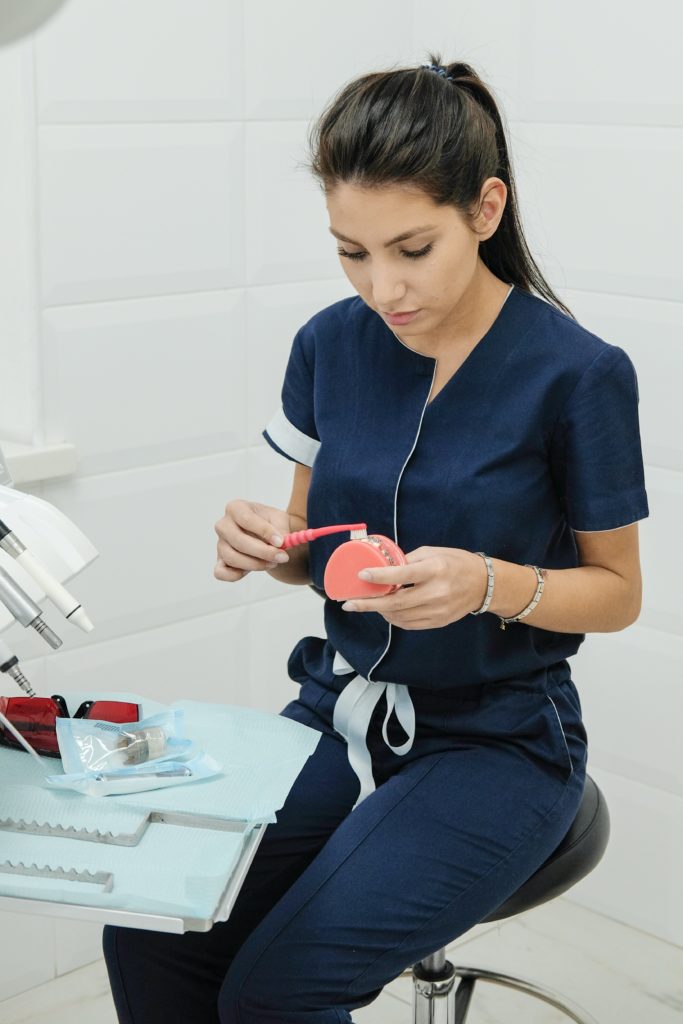Dental implants are durable solutions for replacing missing teeth. When you have dental implants installed, it will be important to take the appropriate steps to keep them in good condition. These steps involve both preventing damage and caring for your oral health, in general. When you take care of your dental implants, you will be able to enhance the appearance and condition of your smile. Here are a few of our tips for taking care of your dental implants.
Depends on Type of Implant

There will be multiple approaches that you will need to take depending on your particular type of implant. For example, if you have dentures, you will want to let them soak overnight. Ensure that you carefully rinse them of the solution before using them again. If you have individual dental implants, you will generally want to ensure that you take care of your teeth in order to keep the implants in good shape.
Avoid Hard Objects
When you have dental implants, it is beneficial to avoid chewing on hard objects or using your teeth as a tool. Chewing or biting down on ice or hard candy can easily cause damage to your teeth. Never use your teeth as a tool to hold objects, open packages, or perform any function aside from chewing.
Try a Water Flosser
A water flosser is a tool that uses a stream of water in order to remove food particles and debris that may be lodged in the teeth. These water flossers are great options for removing more food particles from the surface of the teeth. When you have dental implants, this may be a good addition to keep your teeth cleaner and prevent damage to your dental implants.
Choose Toothpaste without Abrasive Ingredients
Toothpaste that contains abrasive ingredients may cause scratching to your dental implants, as well as wear out the enamel layer of your natural teeth. Avoid using toothpaste that has these abrasive ingredients, such as stain removal agents or baking soda. This will help you to protect your dental implants and minimize the likelihood that they will sustain damage.
Use Toothbrushes with Soft Bristles
When you use toothbrushes that have hard bristles, they will often cause extra wear to your natural teeth and your dental implants. Soft bristled toothbrushes are usually sufficient to thoroughly remove plaque, bacteria, and food particles from the surface of the teeth. You should usually only use a hard bristled toothbrush if you have a dexterity issue that prevents you from effectively brushing your teeth.
Care for your Teeth
When you have dental implants, it will be especially important to ensure that you implement a good oral hygiene routine. Not only is this important to keep the rest of your teeth in good condition, but it will also help to prevent damage from occurring to your dental implants. In order to protect your teeth, it is essential to brush twice every day for at least two minutes. You also need to floss your teeth every day. It may be useful to use crown and bridge floss, which is specifically designed to help you reach the difficult areas around crowns and dental implants.
Regular Inspections
Inspecting your implants on a regular basis will help you to locate damage that may be present. This will enable you to have the damage repaired before it is allowed to escalate to a much larger degree. It is also important to ensure that you inspect any dentures or other products to prevent any damage.
Visit Dentist on a Regular Basis
Your dentist can often help to keep your teeth in the best possible condition. This will also apply to the condition of your dental implants. Visiting your dentist on a regular basis is an important part of ensuring you can identify damage to your dental implants early on. Most dentists recommend that you visit them twice a year, but it is important to listen to the recommendations of your specific dentist.
Caring for your dental implants can help you to keep them in good condition. This can even save you money, because you won’t have to have them replaced as often. Our experts at Mills River Family Dental can help to provide you with the ideal dental implants and related services to protect your oral health. For more information about how to care for your dental implants, contact us at Mills River Family Dental today!
